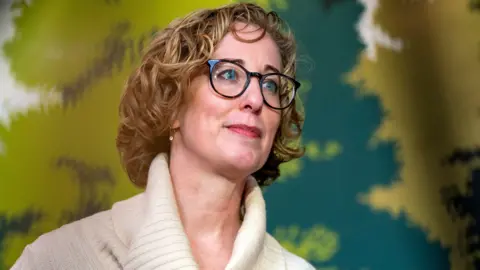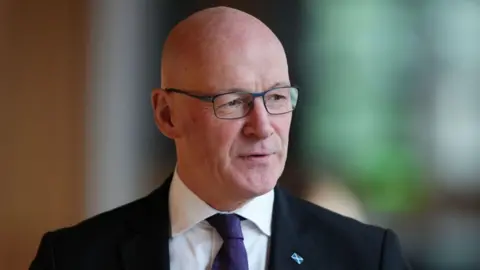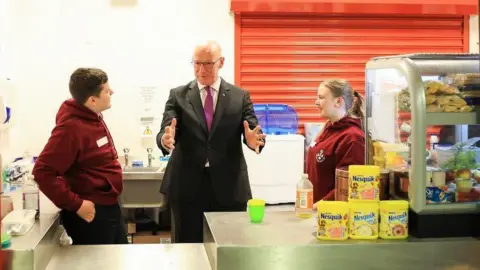Scottish Greens can't back budget without 'green stuff' - Slater
 PA Media
PA MediaScottish Green co-leader Lorna Slater says it is hard to see how the SNP will secure enough votes for the upcoming budget that has "cut all the green stuff".
The Scottish government rolled back on environment initiatives last week as it announced £500m of cuts to plug a gap in public finances.
Past budgets have relied on support from the Greens, but this will be the first since the SNP ended their power-sharing deal.
Ms Slater said "it doesn't look like they want our votes", but the Scottish government said it was confident that "common ground" could be found.
Ms Slater told BBC Radio Scotland’s The Sunday Show: “We worked really hard within government to make sure there was funding for nature restoration, things like Zero Waste Scotland, all the net zero policies - transportation, active travel.
"Greens worked hard to make sure all of our core priorities were funded and we had to make difficult decisions for that to be the case.
“The SNP have now rolled back on all of that. If they wanted Green votes, I think they would have signalled that more strongly.”
This Scottish budget, planned for 4 December, will provide detail on the programme for government announced by First Minister John Swinney last week.
The Scottish Greens have supported every budget since 2016.
But since ending the Bute House agreement in April, the SNP has been left with a minority at Holyrood and needs support from some opposition MSPs to pass its plans.
Ms Slater added: “It is hard to imagine who is going to sign up to this budget. The SNP now are in a difficult place.”
 PA Media
PA MediaMr Swinney said his programme for government announced last Wednesday was focused on “eradicating child poverty”.
However, this included rolling back on an unfulfilled commitment to expand free school meals to all primary school pupils in P6 - P7, which was described as a "betrayal" by the Greens.
Mrs Slater, who previously served as circular economy minister, said a "restoration" of shared priorities in the Bute House agreement would be needed before the Greens supported Mr Swinney's plans.
She added: “We are outside of the room, different choices are being made. Why would we support it?
“It looks like the SNP have changed direction away from that more progressive, more urgent action on the climate.
"As soon as the Greens are out of the room, the SNP backtrack on everything.”
'Common ground'
The Scottish government has said it is still open for discussion with other parties.
Public Finance Minister Ivan McKee told BBC Radio Scotland that there was "a lot of politics" behind Ms Slater's comments.
He said: "You have to remember this happens every year.
"We had the Greens in government for a short time, but for most of the last 17 years, this has been an annual process.
“The Scottish government works with other parties, in most cases to find common ground, and we’ve managed to get agreements from most of the parties at various times.”
Mr McKee said the SNP had already made "significant inroads" in recent years in tackling Mr Swinney's priorities.
He added: "This government is focused on the first minister’s four missions - growing the economy, providing excellent public services, tackling climate change and the move towards net zero and tackling child poverty."
 Getty Images
Getty ImagesMeanwhile, the Scottish Conservatives have said they will use parliamentary business slots next week to urge the first minister to reverse the school meals decision.
Party education spokesman Liam Kerr said: "John Swinney as education secretary personally made this promise to deliver free school meals to every primary school pupil in Scotland.
"By ditching it, it flies in the face of the SNP's plans to eradicate child poverty.
"I urge the SNP to do the right thing and deliver this pledge as promised."
The Scottish government said it was facing significant financial challenges, due to "prolonged Westminster austerity, the cost-of-living crisis and record high inflation".
A spokesperson said: "That means that, whilst we remain resolutely committed to the universal expansion of free school meals in primary schools, this will not now be fully completed by 2026."
